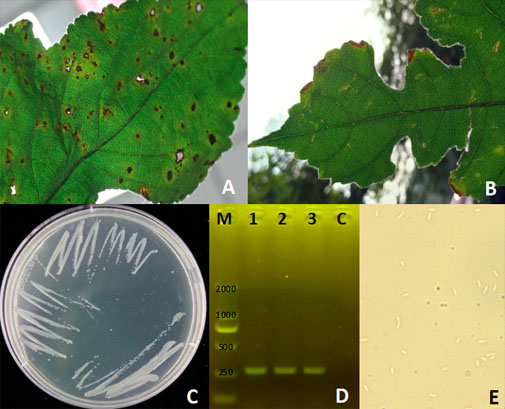
Thanks to the fast-growing nature and high tolerance of dust, smoke, and high temperatures, Broussonetia papyrifera (paper mulberry) is widely used in medicine, animal farming, paper making, weaving, afforestation and light industry.
From June to August of 2019, bacterial canker symptoms on paper mulberry trees were observed in Xishui county, Hubei province of China. Typical symptoms included brown spots surrounded by small, angular, coalescing necrotic leaf spots with yellow haloes on leaves. The incidence rate was around 30%, which seriously threatened the survival and reduced the yield of paper mulberry.
In order to identify the pathogenic organism responsible, Associate Prof. LI Li and Prof. ZHONG Caihong from the Wuhan Botanical Garden focused on the disease investigation and detection.
The results reveals that Pseudomonas syringae pv. Actinidiae (Psa) is the main pathogen causing bacterial canker on Broussonetia papyrifera. Psa has been reported as a pathogen causing bacterial canker of kiwifruit worldwide, resulting in severe economic losses to kiwifruit growers.
As a host of Psa, B. papyrifera will aggravate the spread of the pathogen among kiwifruit, and consequently effective control measures should be taken to manage this disease.
Results were published in Plant Disease entitled "First Report of Bacterial Leaf Spot Disease ofBroussonetia papyrifera Caused byPseudomonas syringae pv.actinidiae in China".
This study was supported by the National Natural Science Foundation of China Science and technology program funded by the Wuhan Science and Technology Bureau.

Natural symptoms of bacterial canker disease on B. papyrifera and morphological characteristics of Psa (Image by WBG)

86-10-68597521 (day)
86-10-68597289 (night)

86-10-68511095 (day)
86-10-68512458 (night)

cas_en@cas.cn

52 Sanlihe Rd., Xicheng District,
Beijing, China (100864)

